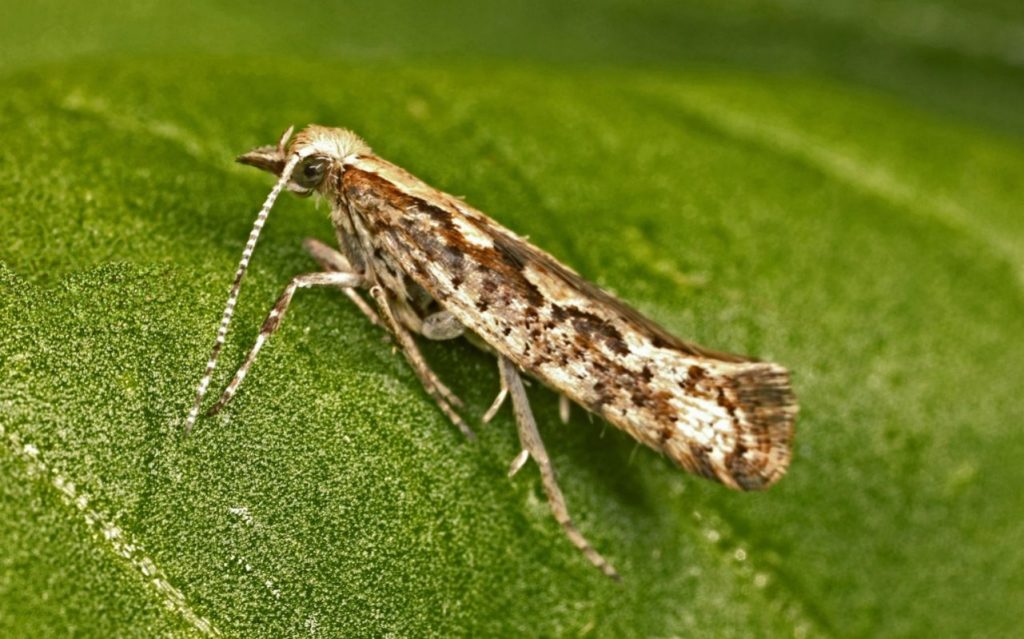Growers better equipped to manage diamondback moth outbreaks
21st February 2017
Growers are better equipped than before to deal with outbreaks of diamondback moth (DBM), as baselines for their susceptibility to chemical control have now been identified. But the UK industry
Growers are better equipped than before to deal with outbreaks of diamondback moth (DBM), as baselines for their susceptibility to chemical control have now been identified.
But the UK industry is warned to expect large numbers of the pests in future, delegates at an AHDB Horticulture workshop heard.
Resistance research at Rothamsted established new baselines for testing DBM samples, which hadn’t previously existed.
The study also confirmed resistance to pyrethroids in DBM, as revealed by AHDB last year.
Dr Steve Foster, Research Scientist at Rothamsted, said: “We tested a range of different chemical insecticides in bioassays for their effectiveness against the larvae of the moths that we saw in the UK last year. Some compounds were effective but the commonly used pyrethroids were not, due to strong resistance.
“If large numbers of new moths arrive in the UK in future years – a scenario which is becoming more likely due to climate change – they could carry different forms of resistance, so future outbreaks may respond differently to insecticide sprays.
Dr Foster added the research means the industry would be much quicker to respond to new DBM threats.
“Our work in 2016 established the baselines and appropriate screening doses that we will need to test these incoming moths in the future. As a result, we will now, hopefully, be able to identify effective control measures of future outbreaks within weeks, not months.”
Dawn Teverson, Knowledge Exchange Manager at AHDB Horticulture said: “Being able to quickly establish the most effective control methods will provide growers with the best chance of managing outbreaks, while minimising effects on beneficial insects.
“This information will mean that growers are using the right controls at the right time and, therefore, limiting crop losses.”
Diamondback moth (DBM) received considerable attention in 2016, as unprecedented damage was caused to Brassica crops and particular concerns were raised about the availability of Brussels sprouts at Christmas. Collaboration between AHDB Horticulture, Warwick Crop Centre, Rothamsted Research and Brassica growers has helped to provide a better understanding of the pest and effective control measures.
Andrew Rutherford, R&D Committee Chairman of the Brassica Growers Association, said: “We saw longer periods of pest activity over the 2016 season and damage has been prevalent over the last five years.
“Historically, we have considered diamondback moth to be a sporadic pest but we now think it is a problem that is here to stay.”
Dr Teverson added that January’s workshop saw growers discuss how they responded to last year’s outbreak and the overwhelming feedback was they turned to pyrethroid sprays.
“This is an established response to similar problems, so it’s not surprising, but we now know that this may, unfortunately, have exacerbated the problem. Not only were the moths resistant but it may have led to a loss of beneficial biological control insects, such as parasitoid wasps, which could have helped manage pest numbers.”
“The research and knowledge which AHDB is sharing through workshops like this means growers are better placed to address future outbreaks, which we now know we are more likely to face in the future,” said Mr Rutherford.
The AHDB Horticulture workshop was attended by over 60 growers, agronomists and representatives of the agro-chemical industry.
AHDB Horticulture-funded research on DBM was also presented at the Brassica and Leafy Salad Conference, which took place the following day in Peterborough. Further information about AHDB’s work on diamondback moth can be found here: https://horticulture.ahdb.org.uk/diamondback-moth

